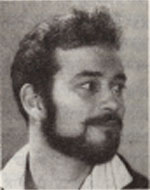Moshe, son of Leah and Aryeh, was born on August 31, 1940, in Kibbutz Mizra. He graduated from elementary school in his kibbutz. Afterward, he completed high school studies at an institution on the kibbutz. Moshe was a talented student and excelled in his studies – both in the humanities and in the real professions. He had a great imagination and from childhood, he was interested in many fields. Within the framework of the class and the educational society, he became known as a sensitive and brilliant youth, with great determination and resourcefulness. He was one of the organizers of social activities, and thanks to his energy and talents, he became a leader among his group. Moshe loved people and found a common language with different kinds of people, and with many, he formed deep and beautiful relationships, based on trust, brotherhood and mutual help. Moshe was always ready to help anyone, with advice and action. He was thrilled by experiences and sights, reassuring his calmness and feeling about his environment, and because of his constant smile he was kind to everyone he met. As a child in the kibbutz he absorbed the love of nature, landscape, homeland and land. These were his great loves all his life. Already as a child he knew all branches of the economy, was interested in what was happening in each of them and loved life in nature. In time, this love became an in-depth study of the Israel Land Department, as well as many long walks, since he took advantage of every spare moment to travel. Moshe was a stable and healthy boy in his soul and rooted in the landscape of the homeland. Aside from his trips, he devoted part of his free time to two other loves of his – photography and literature, and also found time to practice as part of the Hashomer Hatzair youth movement in his kibbutz and educational institution in Mizra. He had deep ties with his family, which were based on mutual understanding and love. Moshe was drafted into the IDF in July 1959. After completing his basic training, he was sent to the tank commanders course and later served in the Armored Corps, and after serving in the Armored Corps, he was sent to an officer’s course. He served as a deputy commander of tanks, and after three years of service he joined the regular army and served for a year and a half, serving as a commander who cared for his soldiers and was interested in their needs and problems. At the end of his regular service he was placed in a reserve unit and was called for periods of six months. In the Six Day War, he took part in battles for Jerusalem, the Jordan front, and the Golan Heights, and during the War of Attrition, he served as a unit commander in the Suez Canal area. And returned to Mizra and began working in the orchard industry, and after a few years he was appointed to the center of the branch, thanks to his dedication and the great knowledge he acquired Despite his busy work, Moshe found time to train and socialize in the kibbutz, Nor did he neglect his old loves-the walks and the tours. Later, he wanted to go out to the wider world and introduce him, and so he went to study in a course that trained emissaries to develop countries. At the end of the course, he left for Madagascar with his wife and daughter Rinat, who was then about three months old. Where he was appointed in charge of an orchards project, one of the largest in Africa. His success in this position was great, and after a year of work, he was transferred to Chad, where he was responsible for the president’s farm. In Africa, too, Moshe took a walk to get to know his country of residence and its inhabitants. He made friends with the workers in the orchard, learned their language, their customs and their way of life, and tried to help them with small things that revealed a new, unknown world to them. When the family returned to Kibbutz Mizra, Moshe’s desire to experience another life, led him to decide to move to the city. He was hired by Yachin, in the industry he loved so much – the orchard. He was appointed as a guide in orchards in northern Israel. About two months before the outbreak of the Yom Kippur War, Moshe and his family moved to Hadera. During the Yom Kippur War, he was drafted and sent with his unit to the Golan Heights, where he participated in the battle against the Syrians. In a battle on the “oil axis” near Hoshenia on October 9, 1973, Moshe was hit by a cluster of bullets that were fired at his tank and killed. He was brought to eternal rest in the cemetery in Mizra. He left behind a wife and daughter, parents, sisters, and brother. After his fall, he was promoted to captain. His kibbutz and members of his family published in his memory a memorial booklet containing the words of friends from various periods of his life about the character of Moshe, his way of life and his activities.
